Homer: The Odyssey
Book XXIV
Translated by A. S. Kline © Copyright 2004 All Rights Reserved
This work may be freely reproduced, stored and transmitted, electronically or otherwise, for any non-commercial purpose. Conditions and Exceptions apply.
Contents
- Bk XXIV:1-56 Agamemnon in the Underworld
- Bk XXIV:57-97 Agamemnon’s ghost tells of the funeral of Achilles
- Bk XXIV:98-204 Amphimedon’s ghost relates the fate of the Suitors
- Bk XXIV:205-301 Odysseus finds Laertes
- Bk XXIV:302-355 Odysseus makes himself known to Laertes
- Bk XXIV:356-411 Dolius recognises Odysseus
- Bk XXIV:412-462 The Ithacans gather
- Bk XXIV:463-501 Athene questions Zeus
- Bk XXIV:502-548 Athene brings peace
BkXXIV:1-56 Agamemnon in the Underworld
Meanwhile Cyllenian Hermes was summoning the ghosts of the Suitors. In his hands he held his lovely golden wand with which he can lull men’s eyelids or wake them from sleep: and with this wand he called the ghosts and led them, and they followed him gibbering. Like bats that flit about and gibber in the depths of an eerie cave, after one falls from the hanging cluster where they cling to the rock and one another, so they went gibbering behind Hermes the Helper, down the dank way. Past Ocean’s stream, and the White Rock, past the Gates of the Sun and the place of dreams, they soon reached the meadows of asphodel where the ghosts abide, the phantoms of men whose work is done.
Here they met with the ghost of Achilles, Peleus’ son, and that of Patroclus, of flawless Antilochus, and Ajax whose form and beauty were greatest of the Danaans, except for the matchless son of Peleus. And these crowded around Achilles. Then the sad ghost of Agamemnon, Atreus’ son, drew near and round him thronged others: the ghosts of all those who met their fate and died with him in Aegisthus’ house. And the ghost of Achilles spoke first to him, saying: ‘Son of Atreus, we always thought you, above all others, were ever dear to Zeus the Thunderer, being the head of our army on the fields of Troy, where we Achaeans suffered. But it seems you too were doomed to an early death: death that none of all who are born evade. How much better it would have been if you’d been fated to die at Troy, still enjoying the honour you commanded! Then the whole Achaean host would have built your tomb, and increased your son’s glory in future days: but now we know it was your fate to meet a pitiful death.’
And the ghost of Atreus’ son replied: ‘Godlike Achilles, son of Peleus, happy to have died far away from Argos at Troy, where round you those others, the best of Trojans and Achaeans were killed, fighting for your corpse, while you in all your greatness lay there in the dust, your horsemanship forgotten. All day long we fought, and would never have ceased, if Zeus had not stopped us with a mighty storm. After we carried you out of the ranks and back to the ships, we laid you on a bier and bathed your flesh with warm water and unguents. Many were the hot tears the Danaans shed over you, many the locks of your hair they cut.
And out of the sea came your mother, Thetis, on hearing the news, with her immortal nymphs, and a miraculous cry echoed over the deep, and made all the Achaeans tremble. Then they wanted to leap up and run to the hollow ships, but Nestor, a man wise in ancient wisdom, whose counsel had often prevailed, held them back. With good intentions he called to them, saying: ‘Stop, you Argives. Achaean youths stand fast! This is his mother come from the sea with her immortal nymphs to gaze on her dead son’s face.’
BkXXIV:57-97 Agamemnon’s ghost tells of the funeral of Achilles
At his words the brave Achaeans checked their flight. The daughters of the Old Man of the Sea stood around your corpse lamenting bitterly. They wrapped your body in an imperishable shroud. And the nine Muses chanted your dirge, responding each to each in their sweet voices. There was not a single Argive to be seen without tears in his eyes, so moving was the clear song of the Muse. Immortal gods and mortal men, we mourned for you, seventeen days and nights, and on the eighteenth we delivered you to the flames, sacrificing herds of fatted sheep and spiral-horned cattle round you. You were burnt clothed as a god, drowned in unguents and sweet honey, and a host of Achaean heroes streamed past your pyre as you burned, warriors and charioteers, making a vast noise. And at dawn, Achilles, when Hephaestus’ fires had eaten you, we gathered up your whitened ash and bone, and steeped them in oil and unmixed wine. Your mother gave us a gold two-handled urn, saying it was the gift of Dionysus, and crafted by far-famed Hephaestus himself. There your ashes lie, my glorious Achilles, mixed with the bones of the dead Patroclus, Menoetius’ son, but separated from those of Antilochus, who next to dead Patroclus you loved most among your comrades. And on a headland thrusting into the wide Hellespont we, the great host of Argive spearmen, heaped a vast flawless mound above them, so it might be seen far out to sea by men who live now and those to come.
Then you mother set out beautiful prizes she had begged from the gods, in the middle of the arena, to award to the best of the Achaeans. You were present yourself at the funeral games for royal heroes, when young men gird their loins and try to win the prizes, but even you would have wondered at the sight, such lovely prizes Thetis, the silver-footed goddess, set out in your honour: for you were the beloved of the gods. So your name was not lost, Achilles, in death, and you will be famous indeed forever among men. As for me what pleasure should I take in having wound up the skein of war? When I returned, Zeus had planned a bitter end for me at the hands of Aegisthus and my accursed wife.’
BkXXIV:98-204 Amphimedon’s ghost relates the fate of the Suitors
So they talked, while the messenger god, Hermes, slayer of Argus, approached, leading the ghosts of the Suitors Odysseus had killed down to Hades. Astonished at the sight, the two went straight towards them. The ghost of Agamemnon, Atreus’ son recognised noble Amphimedon, the brave son of Melaneus, who had played host to him at his home in Ithaca. The ghost of Atreus’ son was first to speak: ‘Amphimedon what disaster sends you all under the dark earth, choice men, and of an age? If one picked the best men from a city they would be like you. Did Poseidon raise cruel winds and tall waves and overwhelm your ships? Or perhaps your enemies slew you when you tried to cut out their cattle and fine flocks, or when they fought to defend their towns and women? Tell me: I am a friend to your house, I swear. Surely you remember when I visited your home, I and godlike Menelaus, to urge Odysseus to sail with us in the oared ships to Ilium? A whole month it took us to cross the open sea, and a hard task it was to win Odysseus, sacker of cities, to our cause.’
The ghost of Amphimedon replied: ‘Agamemnon, son of Atreus, glorious king of men, I remember all of it, favourite of Zeus, as you say: and I will you tell truly how we came to a bitter end. We courted Odysseus’ wife, he being long away, and she would neither refuse the marriage she detested nor bring things to a conclusion, instead she planned a dark fate for us, and contrived a cunning scheme in her heart. She set up a great web on her loom in the palace, and began to weave a wide fabric with fine thread. She said this to us too: “My lords, my Suitors, though Odysseus is dead and you are eager for me to marry, have patience till I complete this work, I do not want it wasted, this shroud for noble Laertes, ready for when pitiless death’s cruel end overtakes him: since I fear some Achaean woman of this land would blame me, if he who won great wealth lay there without a shroud.”
So she spoke, and though proud we agreed. Then day after day she wove the great web, but at night, by torchlight, she unmade it. So for three years she cunningly kept us Achaeans from knowing, and so tricked us. But when the fourth year began, as the seasons rolled by, and the months passed, and the endless days ran their course one of her women who was in the know told us all, and we caught her in the act of unravelling her weaving. So unwillingly she was forced to finish the web.
No sooner had she shown us the robe complete, woven and washed and gleaming like sun or moon, than some malign god brought Odysseus from wherever it might be to the shore of the island where the swineherd lived. And divine Odysseus’ brave son landed there too from his black ship, on his return from sandy Pylos, and after plotting a cruel death for us Suitors they both made their way to Ithaca’s famous city, Telemachus first with Odysseus following later. The swineherd brought his master along, dressed in rags, looking the image of an old, wretched beggar, leaning on his staff. He was so miserably dressed that when he suddenly arrived none of us knew it was he, not even the elders. Quite the opposite: we pelted him with missiles and evil words. But he, with his brave heart, endured being pelted and mocked in his own palace, until at last aegis-bearing Zeus willed him to stir. He and Telemachus took all the fine weapons, piled them up in the storeroom and bolted the door. Then he cunningly told his wife to place his bow and the iron-ringed axes in front of the Suitors, and set a test for us ill-fated youths, that led to our deaths.
None of us could string the great bow: we fell far short of that. When the powerful weapon reached Odysseus, we all demanded it not be given into his hands, however much he desired it. Telemachus alone urged him on, telling him to take it. Then noble long-suffering Odysseus grasped it firmly, strung it easily, and fired an arrow through the iron rings. He moved to the threshold, and standing there, glowering fiercely, he poured out a stream of swift shafts, and so killed Lord Antinous. After that he let his well-aimed darts, death-dealers, fly at the rest of us, and men fell thick and fast. It was clear that some god was on their side: because, in a moment, they had charged through the hall in their fury, slaying men left and right. As they struck at our heads, a hideous groaning ensued, and the floor swam with blood.
So we died, Agamemnon, and our bodies still lie uncared-for in Odysseus’ great hall since the news has not yet reached our homes and summoned our friends to wash the black blood from our wounds, and lay out or bodies, grieving as befits the dead.’
Then the ghost of Atreus’ son cried out: ‘Odysseus, son of Laertes, how resourceful, and how truly fortunate to have won so excellent a wife. What depth of wisdom there is in flawless Penelope, Icarius’ daughter! How faithfully she kept her husband’s image in her mind! So the glory of her excellence will not fade, instead the gods will create a song of delight for mortal ears, in honour of loyal Penelope. How different the ways of Clytaemnestra, Tyndareus’ daughter, plotting evil, murdering her husband. Her tale will be a hateful one to mankind, and she brought odium on her sex, even those of them who do right.’
So, these two spoke together: where they stood, in the House of Hades deep under the earth.
BkXXIV:205-301 Odysseus finds Laertes
Now Odysseus and his comrades had left the town, and had soon come to Laertes’ rich and well-run farm, that he had won for himself with great effort long ago. The farmhouse was surrounded by buildings where the slaves who laboured for him sat and ate, and took their rest. A kind old Sicilian woman cared for the aged man, there on his farm far from the town.
Once there Odysseus said to his servants and son: ‘Go into the farmstead and kill the best pig you can find for our meal. Meanwhile I’ll go and see if my father recognises me on sight or not, since I’ve been so long away.’
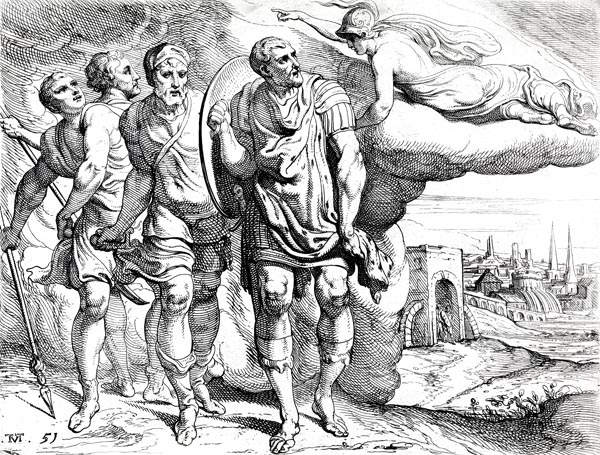
‘Odysseus and Telemachus on their way to Laertes’
With this he handed his armour to his men, and they went off to the farm, but Odysseus approached the fertile vineyard to test his father. As he went through the great orchard he failed to come across Dolius, his sons, or his slaves, since as it happened that led by the old man they had gone to gather stone for the vineyard wall. So he found his father alone in the well-tended vineyard, hoeing round a vine, and nursing his sorrows. He was dressed in a wretched filthy patched tunic, with a pair of stitched ox-hide leggings strapped round his shins to avoid scratches, gloves on his hands to protect against thorns, and a goatskin cap on his head. When noble long-suffering Odysseus saw how old and worn and burdened with grief he looked, he halted under a tall pear-tree, tears in his eyes. He debated in heart and mind whether to clasp his father to him with kisses, and tell him the whole story of his return home, or whether to make trial of him with questions. On reflection he thought the latter was best, to try him with testing words. So with this in mind, noble Odysseus went straight up to him. His father had his head down, hoeing the vines, as his glorious son approached him, saying: ‘Old man, you show no lack of skill in your gardening: in fact you care for it all so well there’s nothing, fig, vine, olive, pear, no planted patch in the whole field that lacks attention. But don’t be offended if I say that you yourself are uncared for: you suffer a sad old age, unkempt and dressed in rags. It can’t be laziness that makes your master neglect you, and you don’t look like a slave in form or manner. You seem more like royalty, like a man who when he has had his bath and dined, should sleep on a soft bed, as indeed old men should. But tell me this in truth, whose slave are you, and whose land do you tend? And tell me in truth as well whether this is really Ithaca I have reached, as someone I met on the way here said just now? He was somewhat obtuse, since he couldn’t bring himself to listen or give me a proper answer when I asked after a friend. I want to know if Odysseus is still alive, or has gone to Hades’ House.
I’ll ask you again, please listen and reflect. I once entertained a guest, in my own land, and never a far-travelled stranger was more welcome. He said that he was born in Ithaca: and that his father was Laertes, Arceisius’ son. So I took him to the house and treated him well and with kindness to the rich stores I had, giving him fitting tokens of friendship. There were seven talents of finely wrought gold, a silver mixing bowl embossed with flowers, twelve singly-folded cloaks, and as many robes and tunics and coverlets, as well as four fine women skilled in perfect handiwork, whom he chose himself.’
‘Stranger,’ Laertes answered, weeping, ‘you have indeed reached the country you said, but it’s in the hands of wild and reckless men. You gave those countless gifts in vain, though if you had found him alive in Ithaca he would have entertained you equally with good cheer, and sent you onwards with ample gifts, as is due in return for a kindness first offered. But tell me truly how long ago you entertained my son, that unlucky guest – if indeed he can ever have existed – my poor son, whom the deep-sea fish have eaten, or who has become a prey to birds and beasts on some far-flung shore. I and his mother who bore him had no chance to wrap him in his shroud and lament for him. Nor was his wife, faithful Penelope, whom he wooed with many a gift, allowed to weep for her husband on his bier after closing his eyes, though that is owed the dead.
Tell me though, truly, about yourself, so I may know who you are, and where you hail from. Where is your city, and who are your parents? Where is the swift ship moored that brought you and your godlike comrades here? Or were you a passenger on board, and did it sail on when you had landed?’
BkXXIV:302-355 Odysseus makes himself known to Laertes
Resourceful Odysseus replied: ‘I will tell you all, quite openly. I hail from Alybas, and my House is famous. I am the son of Apheidas, Lord Polypemon’s son, and I am called Eperitus. A god drove me here, from Sicania, against my wishes, and my ship is anchored opposite the fields some way from the town. As for Odysseus, it is five years since that ill-fated man left my country. Though when he left the omens were good, birds flying from the right. I was glad to see them at parting, and he too, as he boarded ship, and our hearts were full, hoping to meet again as guest and host, and exchange glorious gifts.’
So he spoke, and Laertes was enveloped by a dark cloud of sorrow. Groaning heavily, he filled his hands with black dust and poured it over his grey head. Then Odysseus’ heart was deeply moved, and gazing at his dear father pain filled his nostrils. He rushed forward, caught him in his arms, and kissed him, saying: ‘Father, it is I. I am the man you asked about, home in my ancestral land in the twentieth year. No more sorrow, no more tears of grief. I have things to tell you, and there is little time. I have killed every Suitor in the palace, in revenge for their crimes and their outrageous insults.’
‘If you are indeed Odysseus, my son, ‘Laertes replied, ‘give me some proof of it that will convince me.’
‘See this scar first,’ resourceful Odysseus answered, ‘dealt by the white tusk of a wild boar when I hunted on Parnassus. You and my dear mother had sent me to her father Autolycus to secure the gifts he had promised when he came to visit us. And then, I can list the trees in our fine garden you once gave me. I was just a child and I followed you through the orchard asking about this and that. As we walked through these very trees you named them and told me about each kind. Thirteen pear trees you gave me, ten apple-trees and forty figs. And you promised me fifty rows of vines, ripening at intervals, weighed down by the various bunches of grapes in Zeus’ season.’
At this, Laertes knees grew weak, and his heart melted, knowing the true tokens Odysseus offered. He flung his arms round his dear son’s neck, and noble long-suffering Odysseus caught him as he fainted. When life and consciousness returned he spoke to his son, saying: ‘Truly, Father Zeus, if the Suitors have paid the price for their wanton damage, you gods have power still on high Olympus. But I fear greatly that the men of Ithaca will soon be upon us. They will send for help to all the towns of Cephallenia too.’
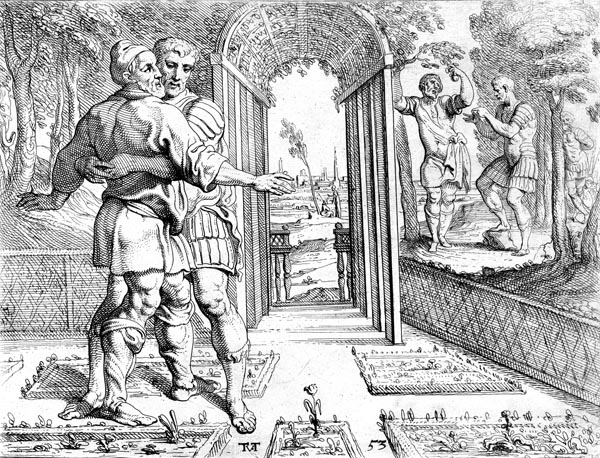
‘Laertes embraces Odysseus’
BkXXIV:356-411 Dolius recognises Odysseus
‘Take courage,’ resourceful Odysseus answered, ‘and don’t let that distress you. Let’s go through the orchard to the farmhouse, since I sent Telemachus and the cowherd and swineherd there, to prepare food for us all as quickly as possible.’
So they spoke and walked to the fine farmhouse, where they found Telemachus and the cowherd and swineherd carving meat, and mixing the glowing wine.
There, great-hearted Laertes was bathed by his Sicilian maid, and rubbed with oil, and she wrapped him in a fine cloak. Then Athene approached and filled out his limbs, and made the shepherd of his people look taller and stronger. He came from the bath and his dear son wondered at his godlike appearance, and he spoke to him winged words: ‘Father, surely an immortal god has made you seem taller and more handsome.’
Wise Laertes replied: ‘By Father Zeus, Athene and Apollo, I wish I’d been standing by your side yesterday in the palace, armour on my back, and driven off the Suitors with the strength I had when I ruled the Cephallenians and captured Nericus that great citadel on the mainland coast. I’d have loosened their knees, then, in the hall, and gladdened your heart!’
So they talked, while the others finished their work of preparing a meal. Then they sat round on chairs and stools, helping themselves to the food, when old Dolius and his sons arrived, tired from their labour in the fields. The old Sicilian woman, their mother, had gone to call them, she who made their meals and looked after the old man in her kindness, now old age had gripped him. When they saw Odysseus, they recognised him, and stood there lost in wonder. But Odysseus spoke to them pleasantly, saying: ‘Sit down to dinner old man, all of you, and stop looking so amazed. We’ve been waiting for you to arrive for ages, despite our desire to eat.’
At this, Dolius rushed towards him with open arms, grasped Odysseus’ hand, kissing him on the wrist, and his words had wings: ‘Dear master, you return to us. We longed for you, but never thought to see you again. Welcome to you, greetings: the gods themselves have brought you back, and may they grant you joy. But tell me this, for certain, does wise Penelope know you are home, or shall we send to tell her?’
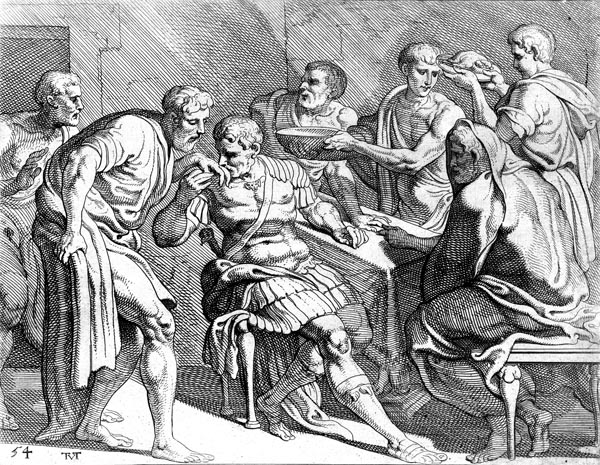
‘Dolius recognises Odysseus’
‘Old man,’ said resourceful Odysseus, ‘she knows already, you need not trouble. At this, Dolius sat down on a polished bench, while his sons crowded round glorious Odysseus, greeting him and grasping his hands. Then they too sat down next to their father.
BkXXIV:412-462 The Ithacans gather
While they were busy eating, Rumour, the messenger, flew through the town with news of the Suitors’ dreadful fate. Wailing and grieving the people gathered in front of Odysseus’ palace, as soon as they heard. They brought out their dead, and carried them away for burial. Those who had been from foreign parts they sent home on swift ships with a full crew then they made their way to the meeting-place. When all had gathered, Eupeithes rose, and spoke, his heart heavy with inconsolable sorrow for his own son, Antinous, the first to die at noble Odysseus’ hands. With tears in his eyes he addressed the assembly: ‘Friends, this man has done terrible things to us Achaeans. He took many brave men with him aboard his ships, and lost every vessel and their men. Now he has killed more, among them the best of the Cephallenians. Come, let us act, before he runs for Pylos or noble Elis, where the Epeians rule, or we will be ashamed forever. Unless we avenge the deaths of our brothers and sons, we shall be disgraced in the eyes of posterity. I would take no delight in being alive: I would rather end it at once, and go to join the dead. Let us make a move before they flee overseas.’
He spoke and wept, and the Achaeans pitied him. Then Medon and the divine bard appeared, having just woken in Odysseus’ Palace. All wondered as they took their stand in the centre. Medon, the wise, spoke, saying: ‘Hear me, men of Ithaca. Odysseus has not worked all this without the immortal gods willing it. I saw a deathless one stand at Odysseus’ side, in the very likeness of Mentor. Now the divine one went before him, now raged through the hall, terrifying the Suitors while they fell thick and fast.’
At his words they all grew pale with fear. Then the old hero Halitherses, Mastor’s son, who alone saw past and future, addressed them with good intent, saying: ‘Listen now, Ithacans, to my words. These things have happened through your own reluctance. You wouldn’t listen to me or Mentor, he an elder of the people, and put a stop to your sons’ foolishness. Claiming he would not return, they wasted the king’s goods, and failed to honour his wife, a disgrace brought about by blind and sinful recklessness. Now listen to what I say and act accordingly. Let us make no move, in case we bring disaster on ourselves.’
BkXXIV:463-501 Athene questions Zeus
When he had finished speaking some remained in their seats, but the majority rose with loud cries, and rushed for their weapons, rejecting his speech, persuaded by Eupeithes. When they had donned the gleaming bronze, they gathered in a crowd in front of the spacious town. Eupeithes foolishly led them, thinking to avenge his son’s death, but he was doomed himself not to return alive.
Now Athene spoke to Zeus, son of Cronos, saying: ‘Son of Cronos, Father of us all, lord of lords, tell me, I beg you, what is your secret intent? Will you encourage vile war and the terrible din of battle, or will you make peace between these two opponents?’
And Zeus the Cloud-Gatherer replied: ‘My child, why ask me? Wasn’t it you who invented this plan, for Odysseus to exact vengeance when he returned? Do as you wish, but I will tell you what is right. Now noble Odysseus has exacted revenge, let them swear a solemn oath that he shall be king till he dies, and let us help the memory of their sons’ and brothers’ deaths to fade. Let them love one another as before, and let peace and plenty hold sway.’ And his words spurred the eager Athene to swoop down from the heights of Olympus.
Meanwhile noble long-suffering Odysseus began to speak, now they had sated themselves with the pleasant meal, saying: ‘Someone should go and find out if they are closing in on us.’
At this command, one of Dolius’ sons went out, and standing on the threshold he saw them nearby, and spoke winged words to Odysseus: ‘Quick, to arms, they are here already.’
They rose at his words and donned their armour. Odysseus and his comrades made four, and the sons of Dolius were six, and Laertes and Dolius wore their armour too, forced to fight despite their grey hairs. When they had all protected their bodies with gleaming bronze they opened the doors and ran out, Odysseus in the lead.
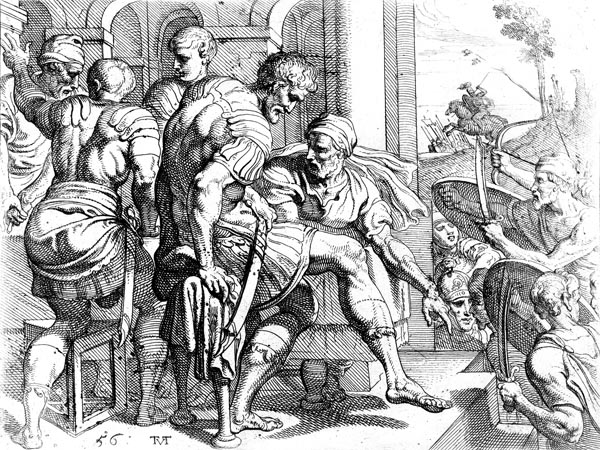
‘Laertes' house is attacked’
BkXXIV:502-548 Athene brings peace
Now Athene, Zeus’ daughter, approached them, in the form and with the voice of Mentor, and noble long-suffering Odysseus was overjoyed to see her, and spoke instantly to his brave son Telemachus: ‘Telemachus, now you have come to a place where the battle shows who is bravest do not disgrace your ancestors’ house. We have always been first in strength and courage.’
‘Dear father,’ wise Telemachus replied, ‘in the mood I am in, you shall see me, as you say and wish, bring no disgrace to our lineage.’ So he declared, and Laertes was pleased, and said: ‘What a day this is for me, dear gods! I am all joy to see my son and grandson argue as to who is bravest.’
Then bright-eyed Athene approached him, saying: ‘Son of Arceisius, dearest of all my friends, pray to the bright-eyed maiden and Father Zeus, then raise high your long spear as you finish, and throw hard.’ With this, while he prayed to the daughter of Zeus, she breathed great power into him. He raised his long spear high as he finished and threw, striking Eupeithes on the bronze-guarded helmet. The spear was not deflected, however, and travelled right through. Eupeithes fell with a thud and a clang of armour. Then Odysseus and his glorious son attacked the leading men, thrusting at them with their swords and double-edged spear-blades. They would have killed the lot, and ended their hopes of returning home, if Athene, Zeus’ aegis-bearing daughter, had not shouted loudly, and restrained the combatants, crying: ‘Men of Ithaca, cease your fight, so that you may part without shedding each others’ blood.’
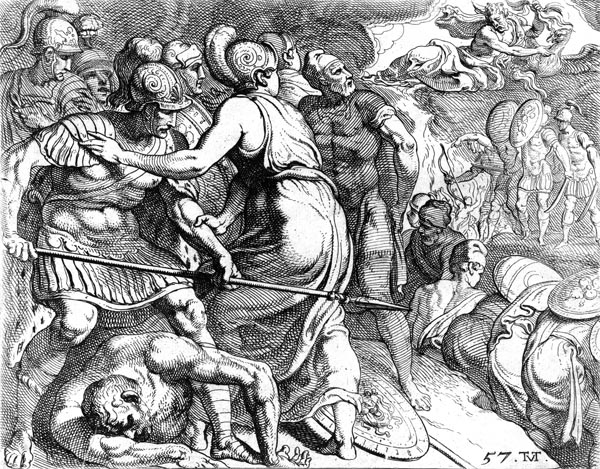
‘Athene stops the battle’
They grew pale with fear at Athene’s call. The weapons flew from their hands in their terror, and fell to the ground, as they turned towards the town, eager to save their lives, eager to fly from the voice of the goddess. Then noble long-suffering Odysseus gave a chilling cry, and gathering himself he swooped on them, like an eagle from the heights, just as Zeus, son of Cronos, let fly a gleaming lightning bolt that fell at the feet of the bright-eyed daughter of that mighty Father. And bright-eyed Athene said to Odysseus: ‘Odysseus of many resources, scion of Zeus, son of Laertes hold back your hand and stop this warring among you, lest Zeus the Thunderer grows angry.’
Odysseus obeyed Athene’s words, delighted at heart. Then Pallas Athene, Zeus’ aegis-bearing daughter, in the form and with the voice of Mentor, forged a solemn truce between the warring sides.
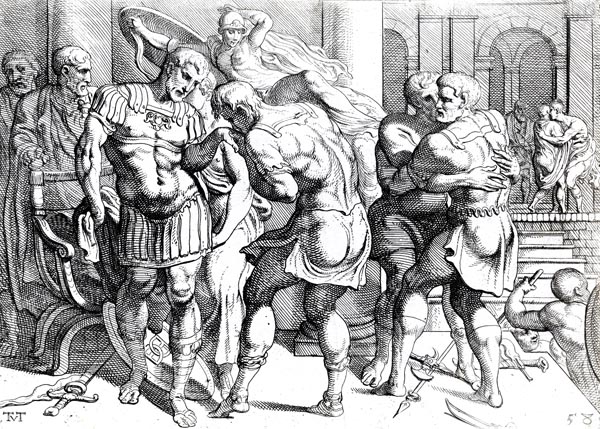
‘Athene reconciles the Ithacans’